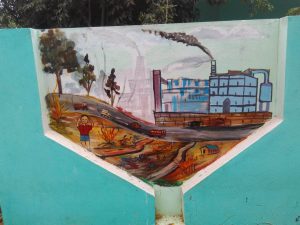The great Indian election has now ended and the people have given their verdict. FIN joins the rest of India in congratulating Mr. Narendra Modi and his party, the Bhartiya Janta Party (BJP), on getting re-elected and holding the reins of power for another five years. So what can we expect? And here, of course, we are referring to our topic of interest the environment.

Let’s go over the main ‘environmental issues’ that have been addressed by the BJP.
Energy autonomy: One of positives of the government was its focus on renewable energy. India is one of the signatories of United Nations Framework Convention for Climate Change (UNFCCC) and historically it has been championing the cause of developing nations. According to a Press Information Bureau (PIB) report, to accelerate development and deployment of renewable energy capacity in the country, the government is taking a number of initiatives like up-scaling of targets for renewable energy capacity addition. The ambitious solar expansion programme seeks to enhance the capacity to 175 gigawatts by 2022, which is expected to be scaled up further thereafter. However, how much of this target is being satisfied by Indian firms and how much by cheap Chinese imports? How can we catch-up in solar panel manufacturing? What are we doing about the end of life problem of batteries and solar panels? These are issues that have received less attention.

Cleaning the Great Ganges river: The much publicized public-private sector project extravaganza the “Namami Gange” with a Rs. 20,000 crore budget (2.87 bn US$ approximately) has not been noted to have had much impact on the cleanliness of the great Ganges river. It is interesting to note that this project again holds a position in their 2019 election manifesto, with the tagline ‘A matter of pride’. While attainment of the objective will contribute to national pride, it is not clear if there has been any evaluation of where the money went and why it has had no significant impact on the state of the Ganges.
Sacrificing trees at the altar of economic development: The claim about increasing forest cover by speeding up environmental clearances is criticized as “ecological ignorance or deliberate neglect”. “‘Environmental clearances’ is a euphemism for allowing forests to be destroyed for mining, dams, expressways, industries and the like,” says Ashish Kothari in his article on The Wire. Neha Singh in her Economic and Political Weekly (EPW) article writes “Even as India is hit by an environmental crisis, manifestos and policies are paying lip service to growth at all costs, including the cost of environmental damage.” Clearly, we need to work more and better at preserving greenery and trees, especially in urban areas.
The big problems of air pollution, waste management, water and soil contamination: The BJP manifesto includes a point on tackling air pollution in cities, but does not seem to contain any clear target vis-à-vis regulation of contamination and waste management, which are two urgent issues to be addressed with respect to the environment.
India is currently ranked 177 among 180 countries on the Environmental Performance Index 2018. This is something which has to change. Many Indians are very concerned about this. Pollution was among the top 10 governance related priorities in urban areas. Nationally, though drinking water found a place in the top 10 governance related priorities, water and air pollution did not make the cut (according to Association of Democratic Reform’s 2018 survey).
But, as we saw from above, and indeed the same goes for all political parties which were contesting – the environment is not on the top of the political agenda. Most unfortunately, it is also a an issue overlooked by voters. While we spend time discussing and debating the economic promises before deciding to vote, we fail to look at the environmental measures that the political parties promise. We fail to see the environment as an integrated part of the system. With increasing issues related to the environment, it’s high time we take these into consideration while choosing the government. There’s always a next time!
But, what about now? We can sincerely hope the new BJP government prove the critics wrong and make a remarkable impact. We can sincerely pledge to stand with the government in tackling these issues to attain a better future. But the Ganga is not going to become clean, the smog over Indian cities is not going to reduce, the water availability and quality is not going to improve unless people DEMAND and express their willingness to cooperate and make efforts for the same. Only such people’s actions will force the political parties to acknowledge the environmental problems and address them.
Adequate knowledge on the environment and conditions we are living in is necessary for everyone to understand the gravity of the present situation and ACT. At FIN, we will continue in our activities of teaching, motivating and training young and old to ACT to preserve the environment and lower contamination through our human and industrial activities. Stay with us and join us in pushing for change from all in society, including citizens, for better waste management, water, soil and air conditions and large green lungs of trees in urban and peri-urban areas.
